In this article:
It is sad to note that many people fail to give their teeth the right care they deserve. This leads to poor oral hygiene that further paves the path for oral health issues, which can include:
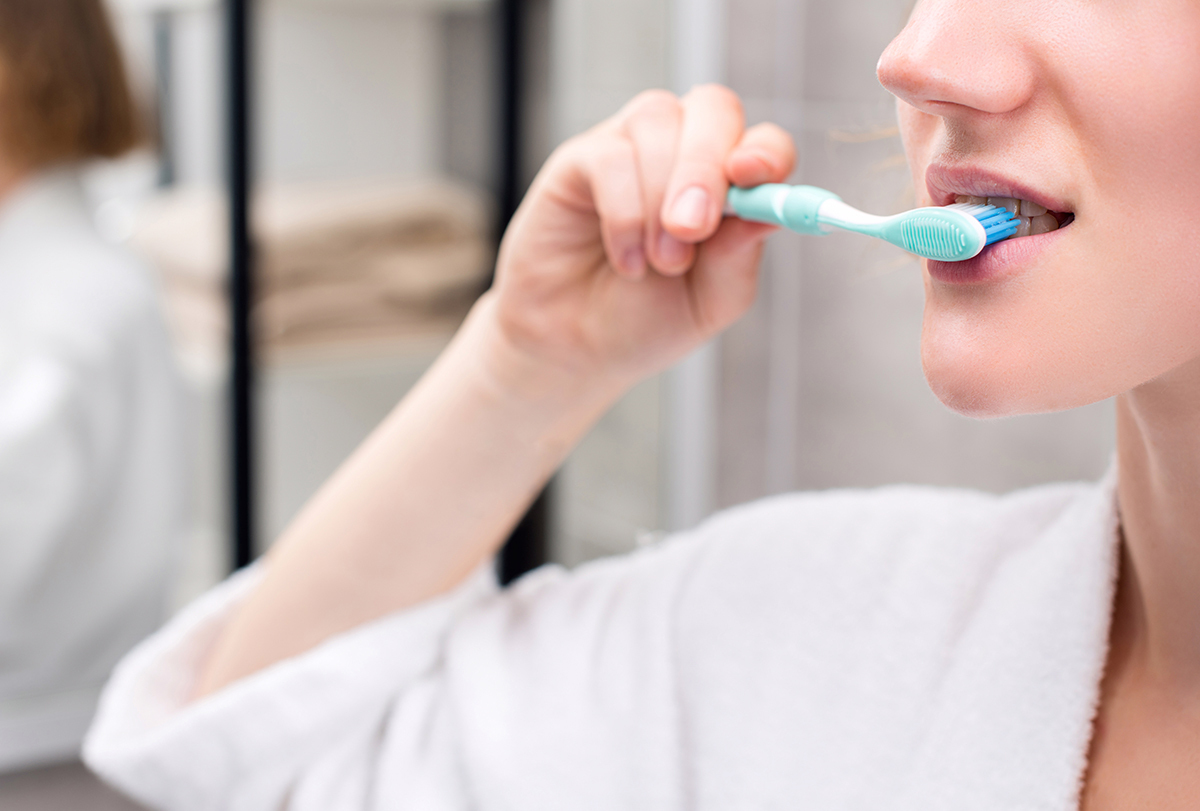
- Gingivitis
- Cavities
- Tartar
- Plaque
- Enamel deterioration
- Foul breath
- Sensitivity
The thing most people are not aware of is that poor oral hygiene not only causes dental conditions but also leads to other serious health problems such as diabetes, heart disorders, and strokes. Poor oral hygiene also negatively impacts a person’s self-confidence as they may not be very happy with their smile, looks, and overall appearance. (1)
The first and foremost step of a good oral hygiene regimen is brushing your teeth thoroughly and properly.
Although you do your best to brush your teeth every day, what may surprise you is that you may be doing it all wrong, such as brushing in the wrong manner and duration.
Steps for Brushing Teeth the Right Way
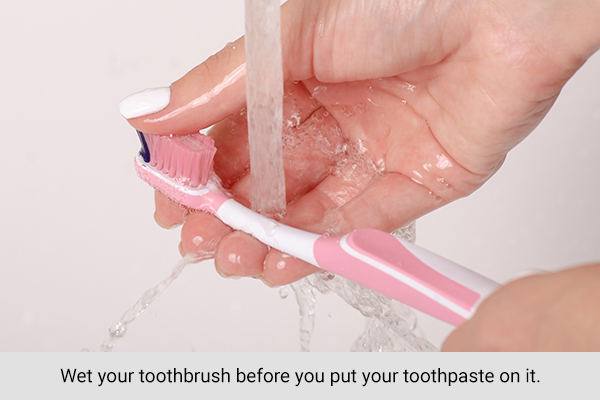
After choosing the correct toothbrush and correct toothpaste for you, it is important to know the right steps to follow to thoroughly clean your teeth. Here’s how:
- Wet your toothbrush before you put your toothpaste on it. This will make the application of toothpaste on your teeth easier.
- Squeeze a tiny amount (pea sized) of toothpaste onto it.
- Start brushing your teeth by tilting your toothbrush and making a 45° angle with your gums. According to a study, 80% of people skip at least 1 sextant when brushing palatinal surfaces. So, start brushing your teeth gently on the outer surface and make sure that you cover every tooth on the upper and lower lines. (2) Moving your toothbrush in circular motions while brushing your teeth is very helpful. Do not rush the process of brushing your teeth and give at least 10 seconds to every spot. A study revealed that most people spent nearly 40% of their brushing time on lateral surfaces scrubbing. However, lateral surfaces should be brushed either in circular or by vertical movements, not by scrubbing movements. (2)
- Brush your tongue as well because bacteria can also accumulate on your tongue and cause bad breath.
- Floss your teeth, which is a very simple process as you only have to take the floss, put it in between your teeth, and try to get any food or plug that may be building up there.
A study presented the sad reality that people who brush two or more times a day only constitute a minority. It is highly recommended to brush your teeth twice daily. (3)(4)
Note: Flossing can be done before brushing your teeth as well. There is no rule that flossing should only be done after brushing your teeth. You can choose what to do first according to your preference.
What to Keep in Mind While Cleaning Your Teeth?
These are some things you need to consider to effectively brush your teeth.
1. Choose the correct toothbrush
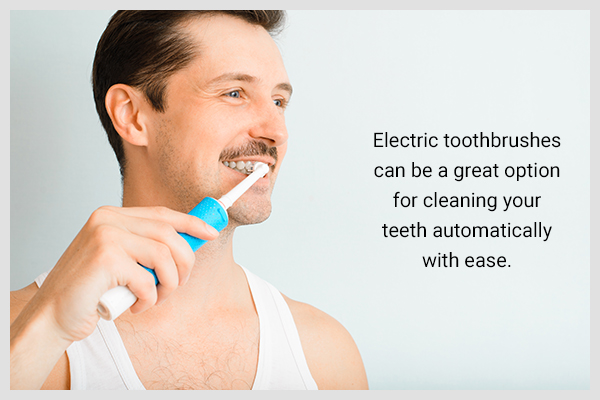
An array of toothbrushes in all different shapes and sizes are available. You have to make sure that your toothbrush is not too big or too small for you. It should fit comfortably in your hand with a good grip.
The head of the toothbrush should be small and flexible so it reaches all the parts of your mouth and easily cleans the teeth. It should also be able to reach the back teeth for thorough cleaning.
The bristles on your toothbrush should be soft and not too hard as hard bristles may damage the enamel. (5)
Electric toothbrushes can be a great option for cleaning your teeth automatically with ease. They even have timers so that you clean your teeth for a sufficient amount of time for better and improved results.
Studies have shown that the use of electric toothbrushes has a better chance of removing plaque than standard or traditional toothbrushes. (6)
It is also important that you change your toothbrush after enough uses. Do not use the same brush for a long time as it loses its bristles and flexibility, affecting its effectiveness in cleaning your teeth. Changing your toothbrush every 3 months is a good way to go.
2. Use the correct toothpaste
Just like there are a ton of options for toothbrushes, a selection of toothpaste is also available. From thousands of flavors to formulations, toothpastes come in all varieties.
Put your focus on the right or enough amount of fluoride content in toothpaste, which is very necessary for removing plaque and protecting the teeth from dental caries. Fluoride is also very important for strengthening the enamel. (7)(8)
In addition to fluoride, other things to look for in a good toothpaste include active ingredients that can:
- Improve sensitivity
- Whiten the teeth
- Reduce tartar
- Improve gingivitis
Note: Irrespective of the ingredients present in the toothpaste, make sure you do not ingest or swallow too much of it. This can lead to serious health issues.
3. Rinse with a good-quality mouthwash
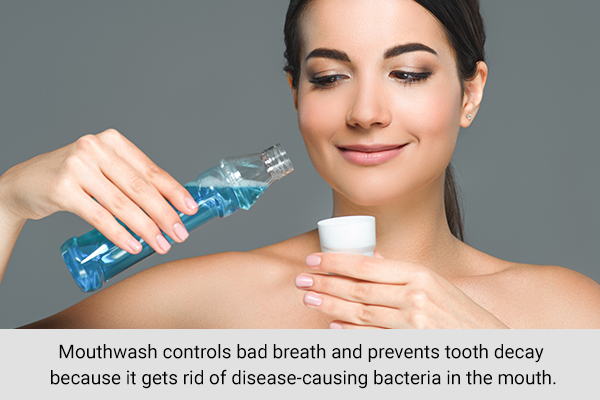
Using a good-quality mouthwash is something that many people often forget. Mouthwash is extremely beneficial in reducing plaque and gingivitis. It also controls bad breath and prevents tooth decay because it gets rid of disease-causing bacteria in the mouth.
Studies have shown that regularly rinsing the mouth with mouthwash in addition to brushing the teeth significantly kills germs in the mouth and lowers the cases of plaque and gingivitis. (9)
Make sure you are not overusing mouthwash as it can also kill the good bacteria in the mouth.
Note: Children should not be allowed to use mouthwash on their own without adult supervision because they might end up swallowing it, which can have serious health consequences.
4. Floss regularly
Another thing that is usually missing from many people’s oral hygiene routine is dental floss. Even though you may be brushing your teeth regularly, you have to remember that flossing them is just as important. Flossing makes sure that no plaque builds up on the teeth and that bacteria or food that is stuck between the teeth is removed. (10)
This is because a toothbrush cannot reach tiny or narrow spaces in the mouth or in between teeth, which can be reached by using floss. Reports show that flossing and brushing your teeth are much better than only brushing the teeth when it comes to controlling plaque buildup. (11)
Additional Tips
- Never brush your teeth too hard because this will hurt your gum and destroy the enamel.
- Never share your toothbrush with anyone for hygiene reasons. Always carry your own toothbrush wherever you go so you don’t have to use someone else’s.
- You may sometimes feel a little lazy to brush your teeth before going to sleep at night, but you should never skip cleaning or brushing your teeth because this can cause bacterial growth, which can lead to bad breath and other health issues.
- It is a good practice to wait for at least half an hour before you brush your teeth after drinking soda or any acidic beverage.
- Rinsing your mouth with water after every meal is a good thing to do because it does not allow food to get stuck in your teeth.
- Make sure you go for a proper dental checkup every 6 months to keep a check on your oral health.
Most-Asked Questions About Tooth Brushing
How often should I brush my teeth?
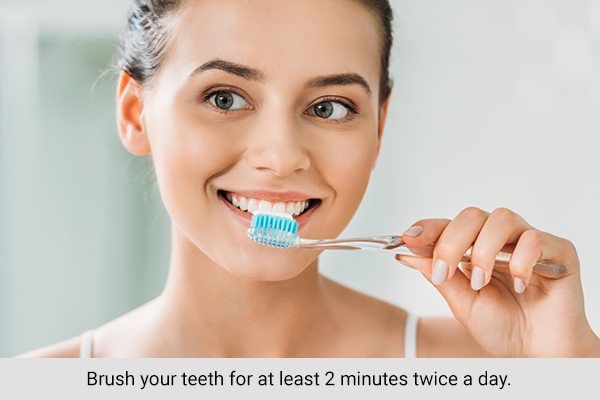
Brush your teeth for at least 2 minutes twice a day. This means that you should brush your teeth first thing after waking up in the morning and before going to bed at night. Studies show that if you brush your teeth less than two times daily, you can suffer from tooth decay and other oral health issues. (12)
How do I clean my toothbrush after brushing my teeth?
After you are done cleaning your teeth, rinse your toothbrush under running water to remove any bacteria. Keep your toothbrush in a place where it can dry completely to prevent the growth of microbes.
Note: Cleaning your toothbrush after brushing is very important because, otherwise, it may be a breeding ground for bacteria, and you can introduce these harmful bacteria into your mouth the next time you use it for brushing.
Why do people advise against the use of toothpicks?
Using a toothpick to take out the food that is stuck between your teeth is not a very good habit because toothpicks can damage the gums and can lead to infections in the mouth. It is always better to go back home and brush and floss your teeth to get rid of food particles or plaque buildup between your teeth. (13)
Final Word
Even though you brush your teeth every day, you’d be surprised to know how you’re doing it wrong all this time. There are things you may overlook and skip while cleaning your teeth that can harm your teeth in the long run.
Poor oral hygiene affects your teeth and can also be bad for your overall health. Therefore, proper oral hygiene practices are essential to keep your teeth healthy.
- Was this article helpful?
- YES, THANKS!NOT REALLY


